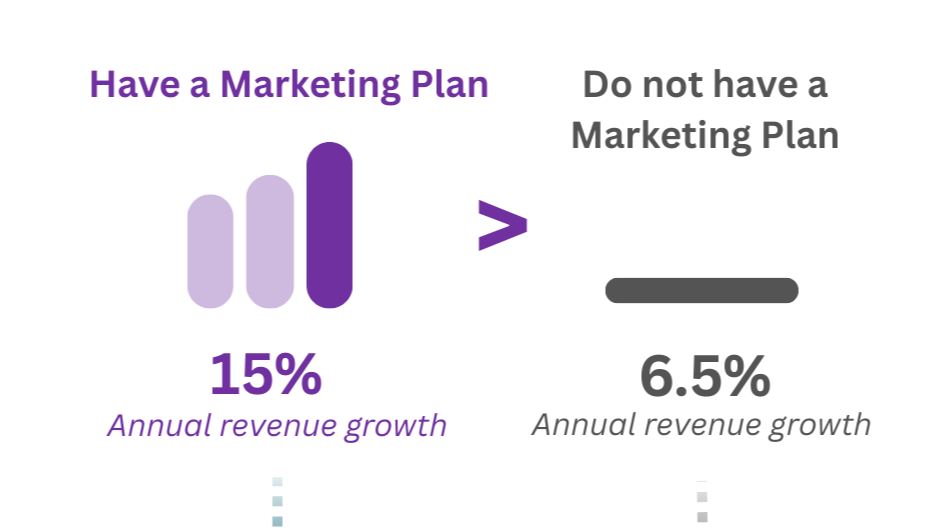The Planning Premium: How a Documented Marketing Plan Correlates With Higher Growth

The importance of planning in B2B marketing.
Personal experience tells us that effective planning is essential in achieving success in business. It serves as a strategic roadmap with clear objectives and milestones, helps align teams, and by tracking progress ensures results are achieved (or course corrections made before it’s too late).
Exactly how much does it contribute to those benefits? We recently commissioned a survey targeting B2B marketers from diverse industries and company sizes to find out. The primary aim was to explore the relationship between having a documented marketing plan and its impact on revenue growth.
The headline: why a documented marketing plan matters.
Our survey revealed a clear advantage for companies that maintain formal, documented marketing plans. Specifically, organizations with structured, documented plans demonstrated significantly higher annual revenue growth (15% on average) compared to companies that failed to plan (6.5% on average). This is a substantial differential – achieving on average more than double the annual growth rate.
Two aspects that can supercharge marketing plans
Digging deeper into the responses, our findings underscore an even starker contrast between those who have a plan and use it, versus those who have a plan and forget about it.
Planning Frequency
Firstly, those companies that update and review their documented plans on at least a monthly basis achieved an average annual growth rate of 25%. In contrast, those limiting reviews to less frequently achieved on average 12% annual revenue growth, dropping to just 5% if plans are only reviewed annually.
Real-Time Plan Data
Secondly, those companies that use real-time or near real-time data (updated within 24 hours) achieve annual revenue growth rates of 25% versus those with weekly (or less current) data experiencing annual revenue growth of just 10%.
Most Common Pitfalls in Documented Plans
Despite recognizing the benefits, many organizations reported challenges in maintaining their plans effectively. A notable 49% of survey respondents indicated significant difficulty in updating budget and performance data within their marketing plans. Such challenges often stem from fragmented tools and outdated practices, hindering real-time insights and agility.
Notably, the top reason provided by respondents without a documented plan was that their business was ‘too agile’ to require or make use of a formal plan. These companies achieve annual growth rates of just 8% - this compares poorly to those that have a plan but consider it somewhat or very flexible (i.e. they change their plan depending on outcomes or changing business context) who reported annual revenue growth of 20% on average.
Tools and Best Practices for Effective B2B Planning
Adopting purpose-built planning tools can alleviate common planning pitfalls. Half of all respondents are using centralized marketing resource management platforms like Allocadia, UpTempo, Marmind, or B2B Planr. These platforms offer structured, efficient, and collaborative environments, ensuring real-time data integration and seamless sharing capabilities. Such tools provide a single source of truth, making it easier to maintain accurate, up-to-date marketing plans. Importantly, they bring visibility to plans meaning teams are able to respond quickly and strategically to market changes or unplanned outcomes.
Conclusion
The data form our survey clearly supports the premium that structured, documented planning can offer B2B organizations. Regularly updated and maintained plans correlate directly with higher growth, improved organizational alignment, and more effective resource allocation. To fully realize these benefits, marketing teams should consider leveraging dedicated planning solutions like B2B Planr, designed specifically to meet the evolving needs of B2B marketers.


